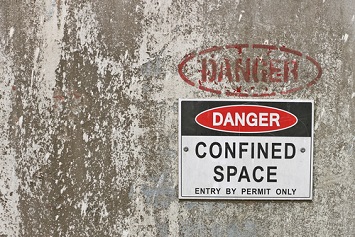OSHA cited a Texas employer for two willful and three serious violations after a worker fatality at Austin-Bergstrom International Airport. The agency is seeking $301,188 in penalties.
Liquid Environmental Solutions of Texas, LLC, did not provide appropriate equipment, procedures, and should have prevented an employee from entering a permit-required confined space, according to the agency. While the airport’s owner, the City of Austin, is not subject to OSHA regulations as a public sector employer, its contractor, Liquid Environmental Solutions, is.
“This tragedy could have been prevented if the company had followed proper safety procedures, such as air testing, communication systems and non-entry retrieval devices for employee rescue situations,” Loren Sweatt, Principal Deputy Assistant Secretary of Labor for Occupational Safety and Health, said in an agency statement.
OSHA Citations
The agency cited Liquid Environmental Solutions with two willful violations of the Permit-Required Confined Spaces standard. The specific violations cited are:
- Not taking effective measures to prevent employees from entering permit-required spaces once the company decided employees would not enter permit spaces; and
- Not providing training to ensure employees understood the hazards of entering permit-required confined space.
The worker suffered asphyxiation after entering a vault where the airport’s grease traps are located. He later died. The serious violations cited are:
- Failing to provide fall protection with guardrail, safety net, or personal fall arrest systems inside the below-ground vault where the grease trap was located;
- Failing to post danger signs warning employees of hazards presented by the grease trap; and
- Violation of the hazard communication standard because the company failed to inform or train employees on the hazards of hydrogen sulfide in the below-ground vault.
Grease Trap Dangers
Commercial grease traps can be hazardous. As food waste decays, hydrogen sulfide (H2S) is released.
“Companies are legally required to test and monitor confined spaces for oxygen content before and during entry,” OSHA Regional Administrator Eric Harbin said.
One of the more catastrophic H2S exposures happened Feb. 2, 2007 at the Orleans Hotel and Casino in Las Vegas, NV. Plumbers and engineers attempting to address a problem with the grease interceptor/trap in the hotel’s sewer system were overcome by hydrogen sulfide inhalation. Two workers were pronounced dead on the scene, another suffered permanent neurological damage.
Confined spaces include underground vaults, tanks, storage bins, manholes, pits, silos, underground utility vaults and pipelines. In the case of commercial grease traps, they may contain a hazardous or potentially hazardous atmosphere.
Compliance with the permit-required confined space entry standard requires the following:
- Preventing employees from entering a confined space without a permit and training;
- Testing the atmosphere before entry for oxygen content, flammability, toxicity, or explosive hazards, and continuing atmospheric testing and monitoring during employee entry;
- Identifying any hazards before entry;
- Reviewing procedures before entry and ensuring employees understand how and when to exit a permit-required confined space;
- Providing respiratory protection if ventilation cannot achieve adequate oxygen levels;
- Using air-monitoring, communication, fall protection, lighting, rescue, and ventilation equipment; and
- Maintaining contact between the employees and a trained attendant at all times either visually, via phone, or with two-way radios.
Monitoring enables the attendant and entry supervisor to order employees to evacuate and alert trained response personnel if necessary.

